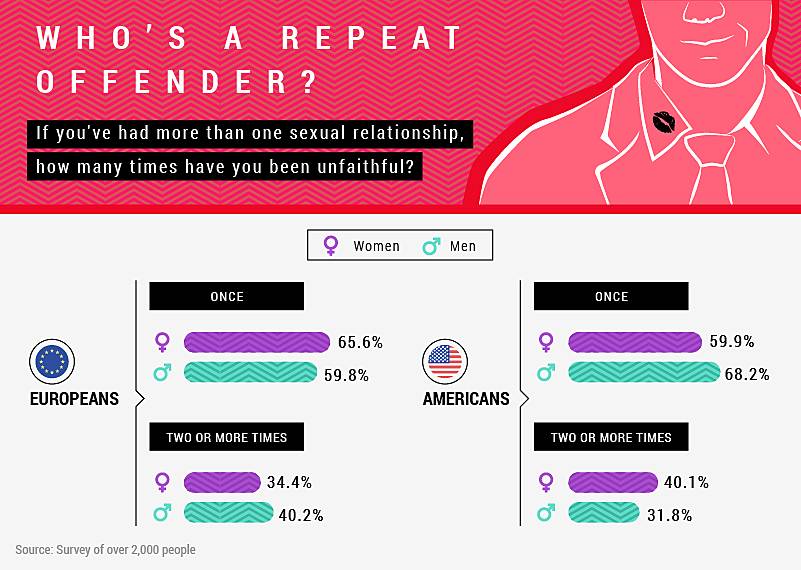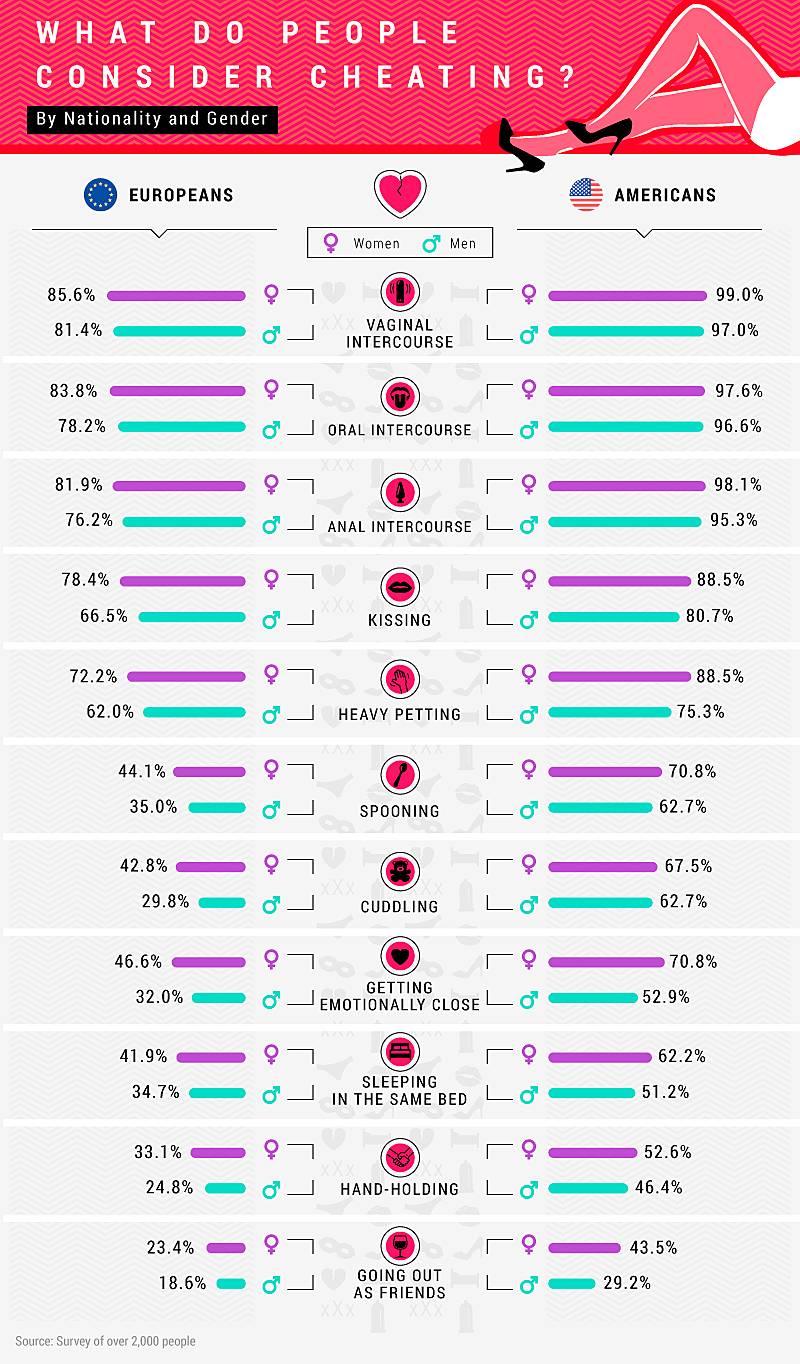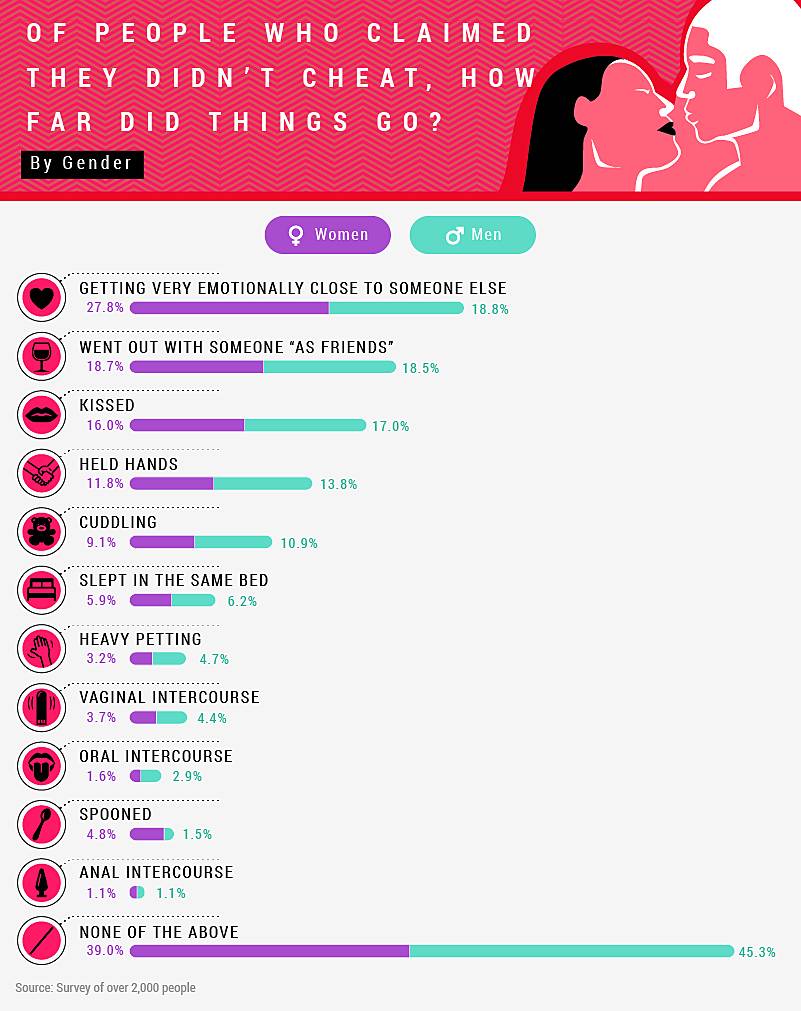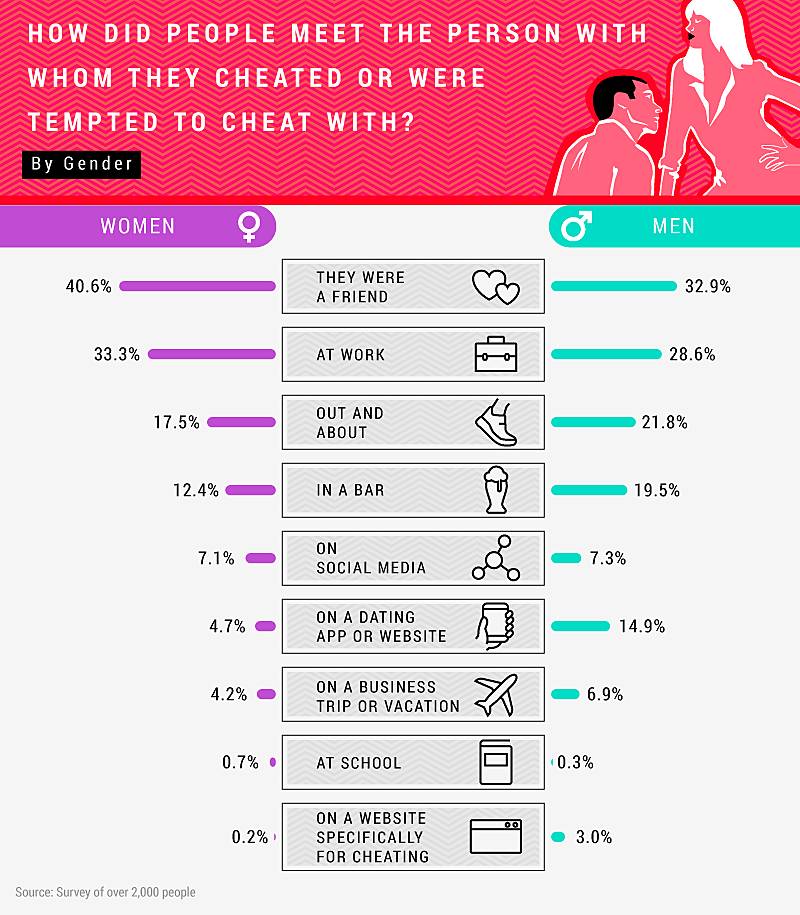
What Is Cheating?
Ever gone too far with someone you shouldn’t have or stopped yourself just before crossing that line?
It turns out, the chance of infidelity increases as much as 25 percent over the course of a relationship. And up to 60 percent of people will cheat at some point during their marriage.
Yikes.
So who’s being unfaithful? And what’s considered cheating anyway? Is spooning or hand-holding a one-way ticket to being single? What about going out with someone just as a friend?
To understand the perceptions of people who’ve cheated, we surveyed over 2,000 Europeans and Americans. Here’s what we learned.
Just a fling?

Most European and American men and women said they cheated only once (between 60 and 68 percent), while a little less than half (32 percent to 40 percent) admitted to more regular affairs. The most likely groups to repeatedly cheat? European men and American women.
Conditions of cheating

For most, sexting, online flirting, or a single passionate kiss fall under the category of cheating. But do cheaters see things the same way? We asked Europeans and Americans – all of whom admitted to cheating or being seriously tempted to cheat – how far was too far? The answers were pretty surprising.
Europeans, who tend to be more sexually permissive, were somewhat less likely to mark most activities as cheating. Even vaginal intercourse – the activity most likely to be considered cheating by all participants – struck nearly 86 percent of European women and over 81 percent of European men as unfaithful.
However, roughly 44 percent of U.S. women felt even going out with someone as a friend fell under the cheating umbrella – a feeling that may align with some U.S. politicians.
How far is too far?

If some participants don’t consider sex as cheating, how far have Europeans and Americans gone without being unfaithful?
For about 39 percent of women and just over 45 percent of men, temptation lost the battle. They saw, they wanted, and they still walked away.
Of those who took it a bit further, but considered their activities not to be cheating, women were far more likely than men to get emotionally close to someone or spoon. Men, on the other hand, were more likely, by a small margin, to have vaginal or oral intercourse and participate in heavy petting.
Why cheaters say they cheat

There are a lot of theories about why people cheat, but what happens when we ask cheaters themselves? The answer: We learn some uncomfortable things about all of us.
For European and American men, the No. 1 reason for stepping out on a partner was “the other person was really hot”. American men also frequently said they were being hit on and could cheat, so they did – an answer that perhaps lends credence to studies indicating women have more self-control than men.
However, for European and American women, the most common reason for cheating was a negligent partner. American women were also likely to cheat with someone who was there for them in a time of need, or someone whom they considered to be “hot.”
How cheating starts

So where do Europeans and Americans most commonly meet the people with whom they cheat or are tempted to cheat with?
According to the data, men and women were most likely to know someone as a friend or meet them at work. However, men were somewhat more likely to seek out an affair on a dating app or website, or a site explicitly for cheaters – such as Ashley Madison, which not only has a male-to-female ratio that isn’t in favour of men, but also has a significant number of fake female accounts.
Do they regret it?

According to our survey, more than half of Americans and Europeans feel guilty about their infidelity. But the group most likely of all to feel guilt? American men. A staggering 71 percent said they would take it back if they could, compared to just 58 percent of American women and 56 to 59 percent of Europeans.
It seems U.S. should practice self-control more frequently to avoid an awkward cheating confession and (more often than not) an ultimate breakup – or avoid certain situations entirely.
“Affairs and cheating are often a function of opportunity. Traveling with a co-worker, being at a party late without your partner, spending lots of time alone, drinking too much, or having independent social circles and activities can create opportunities,” therapist John Howard suggests. “So what to do? Pay extra attention to these types of situations.”
Caught in the act - or not

Is ignorance bliss? Cheaters and non-cheaters alike seem to think so. Over 56 percent of European and American men and women said their past partners never found out about their infidelity or temptations – and they weren’t about to enlighten them.
The group most likely to be caught in the act was American men, with nearly 22 percent saying their partner found out. The least likely group to be found out was European women – about 11 percent said their partners found out about their indiscretions.
Inside the minds of cheaters
How far is too far? Does cheating leave you guilt-ridden? And why do people cheat? Survey people who have cheated or nearly cheated, and you’ll find a lot of varying opinions, with a few common themes.
Dating a woman? Pay attention. Dating a man? If he’s cheating, chances are he feels pretty guilty about it, and you’re pretty likely find out about it eventually.
And, of course, the best way to avoid cheating is to build a better relationship and date people you trust.
And if you’re worried about the physical consequences of cheating or being cheated on when it comes to your health? Services like Superdrug Online Doctor are there to help you understand the health risks involved. Fast, totally confidential, and straightforward, they’ll aim to get you on the right track.
Methodology
We surveyed over 2,000 Europeans and Americans and asked them what they thought about infidelity.
Fair Use
Feel free to share our content for noncommercial purposes. Just make sure our authors are given proper credit.
Sources
- https://psychcentral.com/blog/how-common-is-cheating-infidelity-really
- https://www.truthaboutdeception.com/cheating-and-infidelity/stats-about-infidelity.html
- https://www.huffpost.com/entry/what-is-cheating_n_4638945
- https://daveg.msu.domains/uncategorized/5-countries-that-do-it-better-how-sexual-prudery-makes-america-a-less-healthy-and-happy-place-sex-relationships-alternet/
- https://markmanson.net/why-people-cheat
- https://www.happierhuman.com/self-discipline-gives-girls-the-edge-gender-in-self-discipline-grades-and-achievement-test-scores/
- https://gizmodo.com/almost-none-of-the-women-in-the-ashley-madison-database-1725558944
- https://bigthink.com/articles/america-the-land-of-the-anxious-and-the-home-of-the-stressed/
- https://adaa.org/understanding-anxiety/facts-statistics